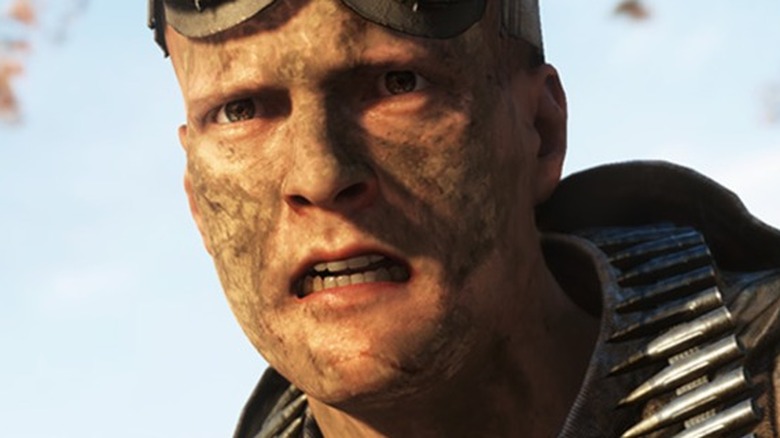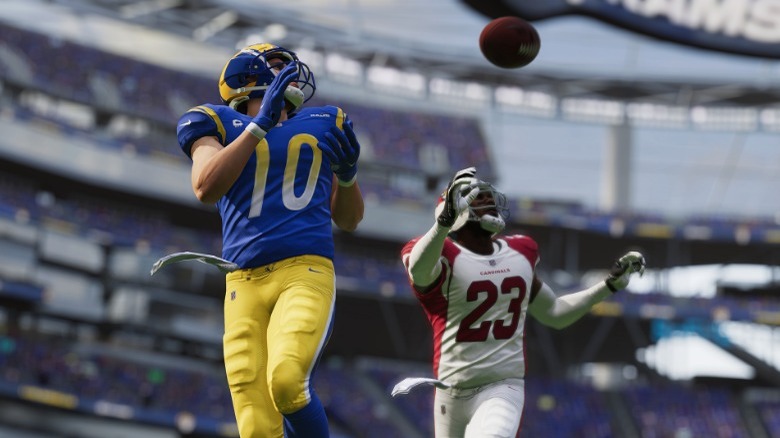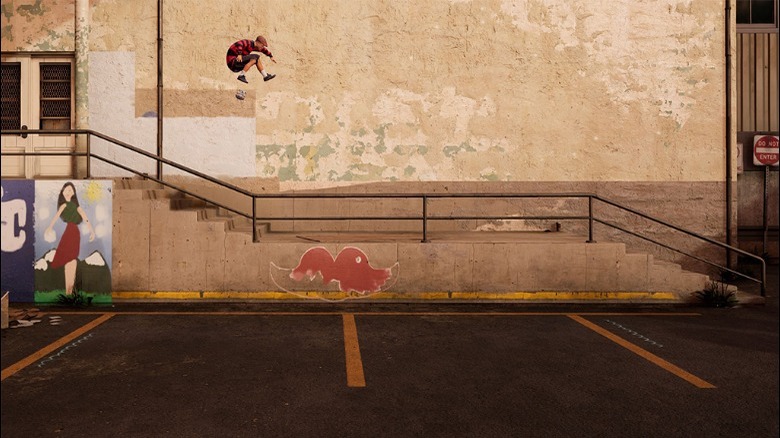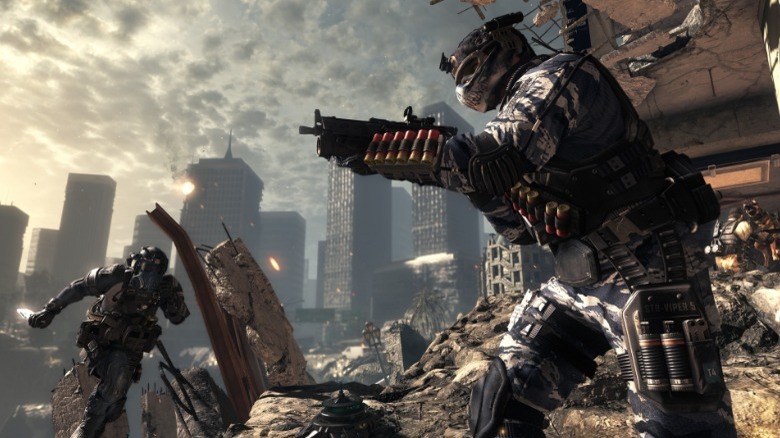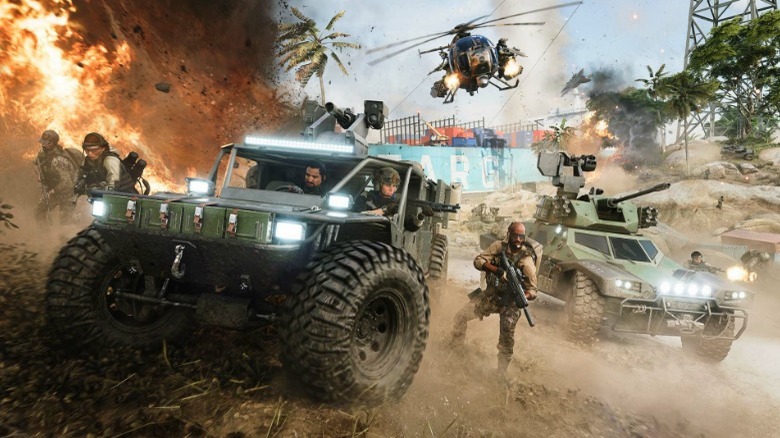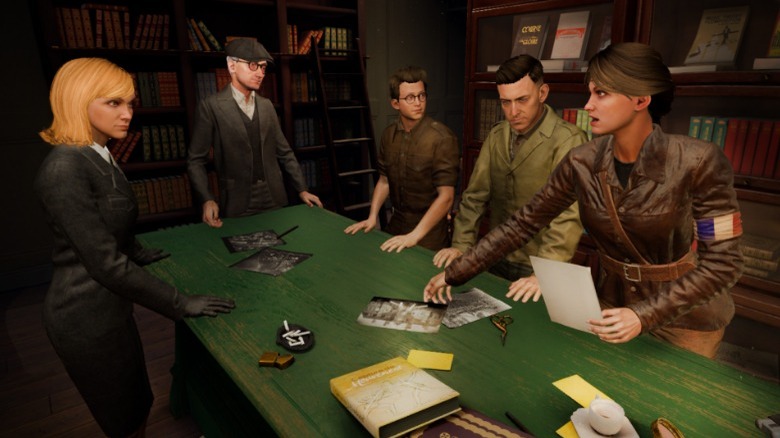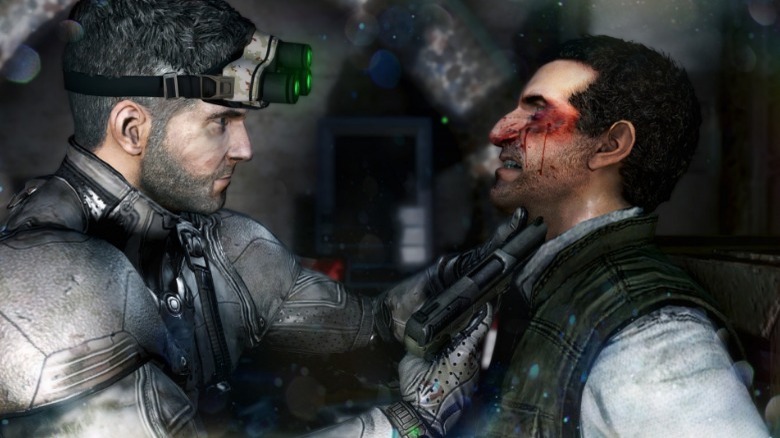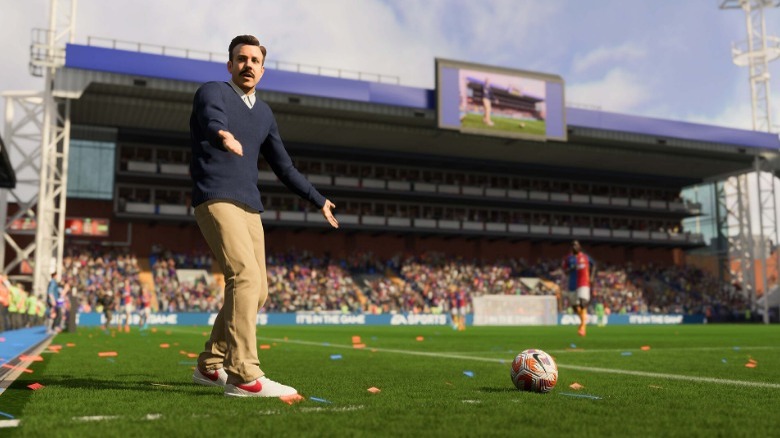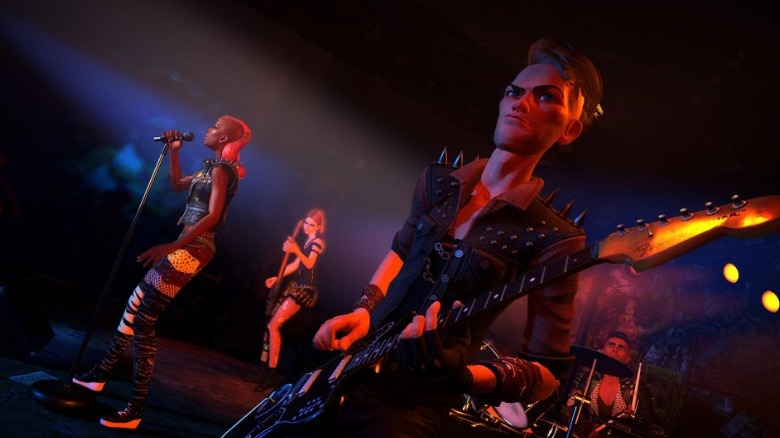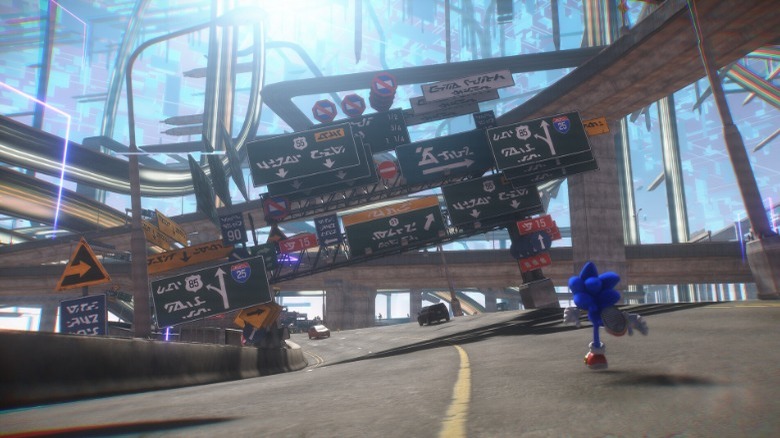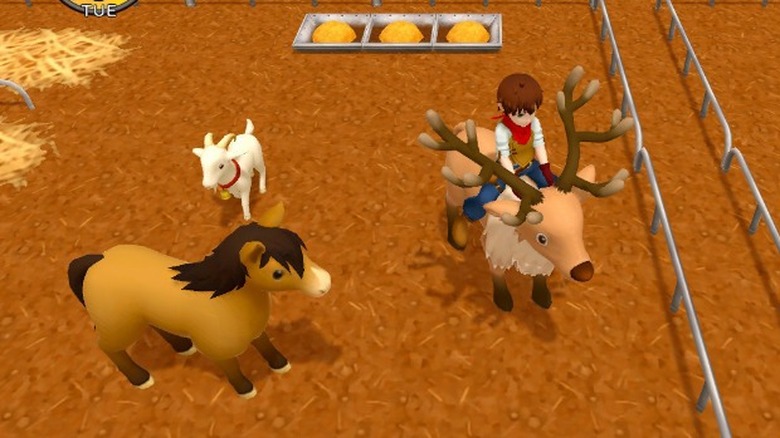Game Series That Dropped So Many Sequels They Killed The Fanbase
Plenty of people enjoy sequels. Maybe a show, movie, or game didn't tell a complete story, so the creators need a sequel to finish the narrative. Or maybe the team behind the product wants a second stab to improve their previous attempt. These are all good reasons to produce a sequel, but sometimes you can have too much of a good thing.
More often than not, publishers try to squeeze out as many sequels as they can. Since sequels generally iterate rather than reinvent, they tend to deliver adventures that are both new yet familiar. There are exceptions to this rule — gamers may never get bored of the original concept or a follow-up plays nothing like its predecessors — but if a company isn't careful, it can end up manufacturing too many sequels, and the quality may suffer as a result.
If the course of a game series isn't corrected, these problems can turn fans against what they once loved. As Harvey Dent said in "The Dark Knight": "You either die a hero, or you live long enough to see yourself become the villain."
Madden NFL
What is the best football game for modern platforms? The correct answer is "Blood Bowl 2," but a turn-based strategy game where fantasy beings compete on a gridiron is a hard sell for most football fans. Anyone who wants a digital recreation of NFL teams and players has to settle for "Madden," which is unfortunate since most audiences claim the series hasn't been good for almost two decades.
In 1989, EA created its first "Madden" game, "Madden NFL." The title has received annual sequels since then. Despite this rough release schedule, the franchise initially innovated and iterated with each entry and fought tooth and nail against rival football games to earn its spots on sales charts (per SOFTDRINKTV). Then EA pulled a fast one, which marked the decline of "Madden."
In 2005, EA signed an exclusivity deal with the NFL, which transformed "Madden" into the only NFL-backed football game franchise on the market (via GameSpot). Without any competition, "Madden" was the winner by default, and thus sloth crept into game design. Either due to apathy or crunch, each "Madden" game after "Madden NFL 2005" was worse than the last. The differences were subtle at first: a bad animation here, a missing feature there. With "Madden 23," reviewers such as Angry Joe have demonstrated that the cost of sequelitis is on full display. The game is burdened by bugs and recycled textures with no innovation in sight.
"Madden" might still sell like Super Bowl rings, but given recent reviews and a general lack of quality, the franchise is one big anti-monopoly argument.
Tony Hawk's
The video game industry goes through phases. Currently, we are in the battle royale phase. Before that, there was the MOBA phase. Go back far enough and you will discover the industry's rebellious youth phase, epitomized by skateboarding legend Tony Hawk.
Once upon a time, Tony Hawk was synonymous with skateboarding. Given the rising popularity of video games, it was inevitable a company would put his face on one, and in 1999, Activision created "Tony Hawk's Pro Skater." The game impressed audiences with arcade-like controls and levels, as well as an iconic and killer soundtrack. "Tony Hawk's Pro Skater" was so popular it became a franchise. The developer, Neversoft, iterated with each entry, adding more tricks and systems and eventually a campaign mode. This work culminated in "Tony Hawk's Underground," but after that, the franchise couldn't keep its balance.
Sites such as IGN didn't think the next entry, "Tony Hawk's Underground 2," lived up to the precedence set by its predecessor. Outlets like GameSpot thought the game after that, "Tony Hawk's American Wasteland," slid even further from grace. "Tony Hawk's Project 8" and "Proving Ground" tried to reinvent the formula but stumbled, whereas "Tony Hawk's Ride" hit the nails into the skateboard-shaped coffin. This installment abandoned controllers in favor of a a game-ruining peripheral — which was the style at the time — but developers forgot to ensure it functioned as intended, as demonstrated by creator brutalmoose. As for the latest "Tony Hawk's" sequel, "Tony Hawk's Pro Skater 5," Matt McMuscles chronicled its development and how gamers wrote the finished product off as a buggy cash grab.
The only good "Tony Hawk's" game post-"Underground" is "Pro Skater 1+2," but that's a remake, not a sequel.
Call of Duty
As of 2021, Activision had sold over 400 million copies throughout the "Call of Duty" series' lifetime with revenue in the billions (via TweakTown). Yet, if you look at review scores, one could assume the franchise was on its last legs. Activision introduced audiences to "Call of Duty" in 2003. Back then, the game was a World War 2-themed FPS, and audiences loved it. The next few sequels took place in the same historical setting and drew similar acclaim. Eventually, the franchise adopted more modern war grounds through the aptly named "Modern Warfare" subseries, which marked the high and low points for "Call of Duty."
Many players claim 2009's "Call of Duty: Modern Warfare 2" is the best "Call of Duty" game. The next entry in the "Modern Warfare" subseries, "Modern Warfare 3," was well-received, but its lack of innovation was a sticking point for sites such as GameSpot. Critics and audiences found more to complain about with each sequel. In "Black Ops 2," IGN pinpointed bad AI, and Eurogamer was less than impressed by the narrative in "Ghosts." Countless reviewers, Angry Joe included, have derided the latest entry, "Call of Duty: Vanguard," as the laziest and buggiest game in the franchise.
"Call of Duty" is a paradox. Despite eliciting a never-ending deluge of criticism, the franchise is running strong. One can only imagine how much stronger it would be if its review scores matched its sales numbers.
Battlefield
Electronic Arts' "Battlefield" has a strikingly similar history to "Call of Duty." But, unlike that franchise, history hasn't been anywhere near as kind. Similar to "Call of Duty," "Battlefield" began life as a World War 2-centric FPS, "Battlefield 1942." While audiences loved the game, its developers quickly abandoned the WW2 setting. Despite a change in battlefield, the next entries, "Battlefield Vietnam" and "Battlefield 2," were as critically acclaimed as "Battlefield 1942," if not more so. The series peaked with "Battlefield: Bad Company," which wowed outlets such as GameSpot with its multiplayer and single-player campaign. After that, the IP fell apart.
The next few "Battlefield" installments didn't measure up, if only because "Bad Company" set the bar too high. But then "Battlefield 4" launched and its countless bugs served as the focus of numerous reviews, including one from Polygon. Sites like Destructoid hated the follow-up, "Battlefield: Hardline," just as much (if not more) due to its poor quality. Plus, that title traded the series-standard military action for crime drama without the requisite narrative chops, and to add salt to the wound, "Hardline" was Visceral Games' final project. To claim gamers (especially "Dead Space" fans) were upset would be an understatement.
The latest "Battlefield" games, "Battlefield 5" and "Battlefield 2042," represent new low points for the series, with the latter sporting some of the worst glitches and performance in the franchise to date.
Medal of Honor
Most gamers have at least heard of "Medal of Honor," but did you know Steven Spielberg pitched the game to his own company, DreamWorks Interactive (via GamesRadar)? He was inspired by his son's adoration for "GoldenEye 007" and decided that since "Saving Private Ryan" wasn't kid-friendly he would share his love of World War 2 drama through video games. This might explain the title's glowing reviews, since almost everything Spielberg touches turns to gold.
Unfortunately, the "Medal of Honor" franchise waned with 2003's "Medal of Honor: Rising Sun." One common complaint is that later missions are nowhere near as good as the opening level (per GameSpy). To make matters worse, the World War 2 setting was falling out of favor with gamers, which didn't bode well for sequels like "Pacific Assault" and "European Assault." While the 2010 "Medal of Honor" reboot reinvigorated audiences, players felt the next entry, "Medal of Honor: Warfighter," squandered that good will with poor AI and rampant glitches. And in a plot twist nobody saw coming, the Navy SEALS who helped work on the game allegedly did so by leaking classified information to developers (via The Washington Post). Their superiors were not pleased.
After "Warfighter," the "Medal of Honor" series hibernated until 2020 when it was revived with the VR title "Medal of Honor: Above and Beyond." Unfortunately, this game was criticized for its poor controls, performance, and story, which may have killed the "Medal of Honor" IP for good.
Tom Clancy's Splinter Cell
These days, "Assassin's Creed" is the one of the only options for audiences who want a AAA stealth experience. Before that IP took hold, Ubisoft had another premiere stealth experience that has unfortunately gone the way of "Metal Gear Solid." In 2002, Ubisoft released "Tom Clancy's Splinter Cell," a stealth action title about the highly-trained black-ops agent Sam Fisher, played by Michael Ironside. The game won over players, and its tight mechanics and novel lighting system let it stand alongside "Metal Gear Solid." Sequels like "Pandora Tomorrow" and "Chaos Theory" expanded on the "Splinter Cell" formula with new tools, abilities, and more open levels.
The first sign of trouble surfaced with "Splinter Cell: Conviction." Before the entry even released, audiences booed previews due to an overreliance on action. Ubisoft listened and decided to go "back to the drawing board" (via GamesRadar+) However, the finished product didn't impress reviewers such as Chris Davis, as it still focuses on action (and headshots) rather than stealth. While the next installment, "Splinter Cell: Blacklist," improved gameplay (according to outlets like IGN), many saw it as the turncoat of the franchise because it replaced Ironside with Eric Johnson, who sounded and acted nothing like the Sam Fisher gamers knew. Why didn't Ironside voice Sam in "Blacklist?" He revealed in an interview that he was diagnosed with cancer and didn't think he could continue with the series.
Fortunately, Ironside pulled through, though the same can't be said for Sam Fisher. Ever since "Splinter Cell: Blacklist," he has been relegated to cameos in "Rainbow Six SIege," "Ghost Recon Wildlands," and "Ghost Recon Breakpoint."
FIFA
Like American football games, soccer used to be everywhere. EA tossed its jersey into that field with 1993's "FIFA International Soccer." The game impressed players, and its ensuing franchise hooked fans by improving the experience and adding new modes with each sequel. As with "Madden," "FIFA" engrained itself in the video game zeitgeist, but eventually microtransactions became a core pillar of the series' game design. Some say "FIFA 15" was the last good entry in the series, but others say it was "FIFA 08" due to its sequel's infamous new mode.
These days, it's impossible to find a "FIFA" title that doesn't reuse assets or isn't plagued by bugs and glitches. However, what truly killed the franchise for most gamers (as pointed out by the SoftDrinkTV team) was the FIFA Ultimate Team mode, or FUT for short. Introduced in "FIFA 09," FUT lets players build their dream team with any soccer stars, but with one notorious catch: FUT runs on loot boxes. No amount of skill lets a player overcome a team built by opponents who threw their life savings at the game. When EA discovered how popular FUT was, it let it cannibalize the rest of "FIFA." FUT is always the most polished part of any "FIFA" title, and new modes such as The Journey in "FIFA 17" usually circle back to FUT and encourage players to spend more money in it (via Viscous).
Many gamers view FUT as the undoing of "FIFA" and as a symptom of widespread problems that have crept into a number of EA offerings.
Guitar Hero/Rock Band
Many modern gamers have fond memories of using a plastic, guitar-like controller to match notes in pursuit of high scores in "Guitar Hero." Or was it "Rock Band?" Those games were so similar it's hard to tell, which is a big reason why players don't see new entries.
"Guitar Hero" is a legendary rhythm game developed by Harmonix and published by RedOctane. The premise is simple: Use a controller shaped like a guitar to press colorful buttons and strum a plastic switch along with the beat. The result is silly but addictive, as demonstrated by "Guitar Hero 3: Legends of Rock," which was the first game to break $1 billion in sales (via Ars Technica). Unfortunately, this success led to the franchise's downfall.
In 2006, Activision acquired RedOctane. But instead of taking Harmonix with it, MTV purchased the studio (per GamesIndustry.biz). What were these businesses going to do? Since Activision owned the "Guitar Hero" IP, it tasked Neversoft with the next sequel. Meanwhile, Harmonix produced a spiritual successor, "Rock Band." Because these franchises were so much alike, they fought each other for attention. Plus, the nature of their design prevented developers from innovating too much. Sure, "Rock Band" added a microphone and plastic drums to the mix, but that was about all it could do. As a result, sequels were more or less rehashes with different aesthetics and songs.
In the end, "Guitar Hero" and "Rock Band" oversaturated the market and audiences lost interest.
Sonic the Hedgehog
Most people out there, gamers or otherwise, recognize Sonic the Hedgehog. He is the mascot of Sega thanks to "Sonic the Hedgehog 1" through "3," which remain some of the best 2D platformers on the market. Like Mario, Sonic eventually explored the third dimension. His first 3D titles, "Sonic Adventure" and "Sonic Adventure 2," proved successful, but Sonic eventually lost his footing.
After the decent "Sonic Heroes," Sega gave the blue bur a break and let his rival, Shadow the Hedgehog, star in his own game. That was the first of the company's many mistakes. The end result, "Shadow the Hedgehog," was derided for being overly edgy (via AntDude), but at least it was functional. The same couldn't be said for "Sonic 06," which was rushed out to store shelves to disastrous results. Following this failure, the "Sonic" franchise entered an experimental phase it never left (or recovered from). While the excellent "Sonic Colors" and "Sonic Generations" were a product of this phase, so were the unresponsive controls of the "Sonic Storybook Series" and the sluggish werehog sections of "Sonic Unleashed" (again via AntDude), in addition to, well, everything in "Sonic Forces" (per Matt McMuscles).
Sonic's name has been so marred by countless mediocre entries that Sega can't announce a new sequel without a heavy amount of skepticism from gamers, which might explain the cold reception towards "Sonic Frontiers" (via VGC).
Harvest Moon
Video game IP rights can be a messy business. A publisher might own the name of a franchise, but without the right development team, they don't have a product — or at least a good one. In 1996, gamers discovered the relaxing zen of simulated farming via "Harvest Moon" ("Farm Story" in Japan). The first few entries were developed by Amccus and published stateside by Natsume Inc. Gamers loved these titles, but as is often the case, business acquisitions put an end to the fun.
In 2003, Marvelous Entertainment purchased the franchise's Japanese publisher, Victor Interactive (per GameSpot). Marvelous collaborated with Natsume until 2014, when it published "Story of Seasons." Despite the name change, that game is a sequel to "Farm Story." Marvelous' Head of Development, Yoshifumi Hashimoto, confirmed in a Nintendo World Report interview that the game is part of the franchise since it goes by "Farm Story" in Japan. This development left Natsume with the "Harvest Moon" name but no game to go with it, so the publisher funded its own with a new developer, Tabot, Inc. Audiences panned the result, "Harvest Moon: The Lost Valley." History and reviews repeated themselves for every sequel since, including "Harvest Moon: One World" (via Nintendo Life).
Given the lack of quality in recent "Harvest Moon" titles, most gamers view "Story of Seasons" as the true "Harvest Moon." Even "Stardew Valley" has usurped "Harvest Moon" of its crown. "Harvest Moon" faces the very problem the franchise's creator, Yasuhiro Wada, predicted in a 2009 interview with Eurogamer. Natsume has relied so much on producing "Harvest Moon" sequels that it has poisoned the series' name, just as Wada foretold.

